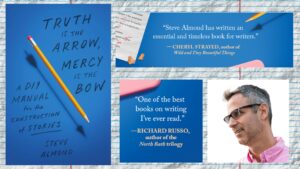Posts by Randy Susan Meyers
Please welcome multi-published author Randy Susan Meyers back to Writer Unboxed today!
Randy is a critically acclaimed national bestselling author of five novels; The Massachusetts Council of the Book has selected three of them as Must Read Books. Her novels explore domestic drama, societal issues and cultural nuances, informed by her years working with troubled youth, community, and government agencies; working with criminals and their families as a director of a Batterer Intervention Program; and a decade of working as a director of Boston’s Community Centers.
She teaches at the Grub Street Writer’s Center and lives in Boston with her husband.
Her latest novel, The Many Mothers of Ivy Puddingstone, releases this October. You can learn more about that and Randy’s other works on her website.
Do I have writing beliefs? A personal set of ‘rules’ by which I write my books? Yup. I can boil the almost-unbreakable ones down to five:
Those are my ‘artistic’ principles; my ‘craft’ rules run longer and less dreamy, though I demand adherence on both ends.
I believe all writers have rules—whether set in stone, vague roads we follow, or market-place-driven edicts. And if we all had the same self-driven mandates, libraries would be boring places.
Since composing my rules and completing a Homemade MFA, where I relied on writing books (craft, prescriptive, dreamy) for tools and my twenty-six-plus jobs for inspiration, I’ve read hundreds of craft books.
The newest writing book I’ve read, TRUTH IS THE ARROW, MERCY IS THE BOW, immediately nudged into number two on my list from the first chapter. (SELF-EDITING FOR FICTION WRITERS by Renni Brown and Dave King will always hold my number one spot for being the book that provided the initial brilliant and easy craft tools.)
Steve Almond is fantastic on stage; I’ve known this since I met him in 2008. He’s self-deprecating, funny, fluid, and supremely interesting. He’s so good that I schlepped out of my house (and honestly, who wants to leave their house anymore?) and drove an hour at rush hour to hear him speak about his book on writing.
From the moment I heard him speak about his book at Belmont Books, I was eager to buy it, not just because, as a good literary citizen, I always buy the book at a reading—even if I own ten copies of that book, even if it’s my damn book (I tell the bookseller to give it to their favorite customer,) and even if I secretly find the writer to be a bore and a boor. (Steve was neither.)
Almond’s facile mix of craft, memoir, admitted mistakes, and an insistence on power and honesty over performative work well matched my reading and writing beliefs. With each page, I found myself nodding a silent, uh huh, and using my highlighter until the yellow ink ran out.
The first story he told at Belmont Books (about teaching in China—a presentation he painted incredibly in the book) notably illustrated how much of what we do in writing and reading is rooted in discovery. Sometimes, it is a […]
Read MorePlease welcome multi-published author and returning guest Randy Susan Meyers back to WU! Randy is an internationally bestselling and award-winning author of five novels, most recently Waisted, which releases TODAY in paperback. Randy’s books have been translated into over twenty-five languages and been chosen three times as a Massachusetts Book Award “Must Read.” Besides reading, her obsessions include gardening, painting garden art, and, during the pandemic, bingeing on ER reruns. She lives in Boston, where she teaches at Grub Street Writer’s Center.
Follow Randy on Twitter, and be sure to visit her website to learn more about her novels.
Terrified About Writing Your Novel? Excellent!
I played with the first line, “Everyone hates a fat woman,” for a decade (and published four other novels) before writing Waisted. The story of women obsessed with the scale screamed in my head, but I kept the words locked away. Because writing it meant facing myself. Writ honest, the novel would have to include tales of self-loathing, food needs so intense one snatches it back from the garbage, and dressing room terror because, for me, no story is worth writing without emotional honesty at the core.
And I wanted to avoid this particular honesty.
When I was a child, my mother hid everything sweet and delicious in a giant lobster soup pot on top of the tallest cabinet in the kitchen. Thus, my sister and I, at the tender ages of perhaps five and eight, learned to be mountain climbers. (Only recently did I consider that maybe Mom was hiding the cookies from herself.) Living with my thin, beautiful, food-hiding mother, I learned:
All of which led to my novel, Waisted, where weight-obsessed women chosen for a documentary about women and their bodies—an endeavor that promises to heal them—find themselves on lockdown at a hardcore reality show run by punishing, fat-shaming filmmakers.
Before writing Waisted, I didn’t feel ready to hit the personal nadir delving into issues of women and weight could/would ignite. Hiding from the truth was far more inviting. And yet, “Everyone hates a fat woman” wouldn’t let go. So, I began.
Once embroiled in the story, I never wanted to eat again, and I wanted to eat every minute. I never wanted to look at a scale, and I wanted to weigh myself three times a day. Part of me wanted to continue denying the cruelty we face from ourselves and others, but if I wanted to write an authentic story, I had to open myself to every loathsome thought I’d ever had about myself and every bit of self-hatred I (and I imagined […]
Read MorePlease welcome bestselling author Randy Susan Meyers to Writer Unboxed today! Randy’s latest novel, WAISTED, tackles the hot and important topic of body image. More about Randy from her bio.
Randy Susan Meyers’ novels are informed by over twenty years working with criminal offenders and families impacted by emotional and physical violence. With Waisted she tackles an issue both personal and political: body image.
Reviewing Waisted, Booklist wrote “Meyers exquisitely explores body image, family, and marriage in this surprisingly deep novel. Though she starts with a fictionalized version of the TV show The Biggest Loser, she dips into major issues of race, culture, obsession, and sisterhood. Taking on the timely topic of how a woman is perceived in today’s society, she twists it into how far women will go to be what society deems right, and at what cost—a marriage, a family obligation, a personal goal? A compelling story that will leave readers giving their scale the side eye.”
Waisted has been chosen as a Top 2019 Summer read by Parade Magazine, Pop Sugar, BookBub, Women.com, Get Literary, and Brit.Com. Kirkus Review wrote, “Meyers spins a compelling tale, raising critical questions about familial, social, and cultural messages about body image . . .” and Library Journal said “Meyers delivers a timely examination of body image, family, friendship, and what it means to be a woman in modern society. It will appeal to anyone who has ever dreaded stepping on a scale; even those who haven’t will learn from it. Culturally inclusive and societally on point, this is a must-read.”
Meyers is a Brooklyn-Boston mix who believes happiness requires family, friends, books, and an occasional NY bagel. She lives in Boston with her husband where she teaches writing seminars at Boston’s Grub Street Writers’ Center.
Randy’s post offers some words of wisdom–and humor–about something all published authors have to grapple with eventually: bad reviews. Enjoy!
Soothing Words for Bad Reviews
It was the best of times; it was the worst of times.
I’m talking about launch time, of course. By the time this essay is published, my newest novel, Waisted, will be out in the world. As will the reviews. From the trades, magazines (perhaps,) newspapers (maybe,) bloggers, members of Goodreads, library thing, librarians, Amazon, Barnes & Noble, Audible, iTunes customers, and, most likely, my auto mechanic.
This time around I’m especially nerved-up. Waisted is the most polarizing book I’ve written. For every fiercely feminist, urgent, darkly humorous, compelling and wickedly fun, observation, I’m piling up knife-like words that indict me for even attempting to write down the inside thoughts of women reacting to a world that treats fat women as pariahs.
And do I respond, as many have written, with mature acceptance of the varied opinions of the world? Do I try, as many have written, to learn from what they write? Do I sigh and think, well, that’s their opinion?
No, I do not. I react like a slug sprinkled with salt. Honestly, one mean (meaning the reviewer didn’t love it) review can overtake reading fifteen filled with accolades.
Upon reflection of said mean reviews I do not cull the wisdom therein. I think of what my next career will be. Certainly, it will be a hermetic vocation that won’t even make the pages […]
Read MoreTherese here. Please welcome returning guest Randy Susan Meyers, author of the bestselling novel The Murderer’s Daughters and her latest book, out this past week, The Comfort of Lies.
Because of ongoing negotiations between Barnes and Noble and Simon and Schuster, Randy’s novel isn’t on display in Barnes and Noble stores -a loss of visibility that can hurt a book’s sales potential. In the spirit of helping a fellow writer, WU will be sponsoring a giveaway today. Leave a comment on Randy’s post for a chance to win a copy of her novel. In two days time, we’ll randomly chose a winner (U.S. or Canada only, please). Even if you don’t win, we hope you’ll support this book by buying a copy yourself and/or helping to spread the word about this book. Thank you!
What’s The Comfort of Lies about?
Three Mothers. Two Fathers. One Child.
Five years ago, Tia fell into obsessive love with a man she could never have. Married, and the father of two boys, Nathan was unavailable in every way. When she became pregnant, he disappeared, and she gave up her baby for adoption. Now, she’s trying to connect with her lost daughter and former lover.
Five years ago, Caroline, a dedicated pathologist, reluctantly adopted a baby to please her husband. She prayed her misgivings would disappear; instead, she’s questioning whether she’s cut out for the role of wife and mother.
Five years ago, Juliette considered her life ideal: she had a loving family, a solid marriage, and a thriving business. Then she discovered Nathan’s affair. He’d promised he’d never stray again and she trusted him. But that was before she knew about the baby.
Now, when Juliette intercepts a letter containing photos meant for Nathan, her world crumbles again. How could Nathan deny his daughter? And if he’s kept this a secret from her, what else is he hiding? Desperate for the truth, Juliette goes in search of the little girl. Her quest leads to Caroline and Tia and before long, the women are on a collision course with consequences that none of them could have predicted.
I’m so pleased Randy is with us today to talk about the fine line between lying and storytelling. Enjoy!
How I Began Writing and (almost) Stopped Lying
My sister and I are great liars. World-class liars. Maybe we were born with the trait. After all, our paternal grandmother’s top hobby was shoplifting. Brooklyn-born Great-Aunt Sally (Jewish, like the rest of the family) pretended she was Catholic and French—and went to the Sorbonne. She even spoke English with a Gallic lilt. A great-uncle took a new identity—and nobody knows why.
Whatever side of the family you examine, Jill and I were born for fabrication. In childhood we had all the appropriate Psych 101 lying factors: substance abuse, instability, disappearing act—lying was our safest course of action. In a world of quick slaps and slow forgiveness, our motto was ‘admit nothing.’
“No, we didn’t break the lamp!” (We did. And then precariously glued the pieces together, shrugging when our mother barely touched it after it shattered.)
“Why would I take your shirt, Mom?” (Because I wanted to wear it.)
“I didn’t cut school! They’re crazy.” (Yes, the […]
Read MoreTherese here. Author Randy Susan Meyers first turned me on to Betsy Lerner–author, former editor, and now an agent with Dunow, Carlson and Lerner Literary Agency. Betsy wrote a book that Randy raved about called The Forest for the Trees, so you know I had to check it out. Here to tell you, it’s just as fantastic as Randy said it would be. Newsday said of this book of advice for writers “Brilliant…Cleverly disguised as a sensible reference work [this] is in fact a riveting safari through the wilds of the writer’s brain, as well as an honest and unpatronizing guide to publishing from every angle.” It is, in all honesty, a book I wish I’d had two years ago, before my book deal.
As it happens, Betsy’s book was just released in a second edition. I invited her here today to blog with us, offer up a touch of her wise advice. Enjoy!
Do not show your writing to your mother or your lover
Do not show your writing to your mother or your lover. And here’s why: they either love you too much and cannot be honest, or they are ambivalent about you and will hurt you. The most popular post on my blog was when I wrote about hurtful things people say to writers. In the comments were the most cruel stories of writers at the hands of parents.
Another reason not to show your work to loved ones and lovers is that they often don’t know that much about writing. It would like asking me to look at your plumbing just because I was the closest person around.
Another reason: you presumably want to have a continuing relationship. Nothing hurts more than comments about your work. It’s worse than comments about your personal appearance, and no one takes more liberty with these than loved ones and spouses.
What you want, what you need, is a writing workshop.
Read More














